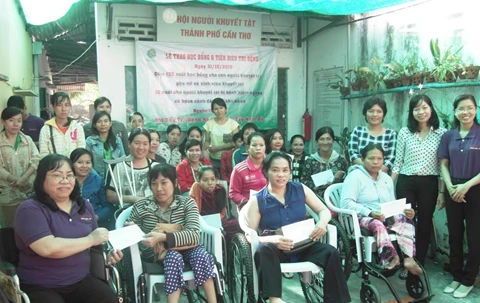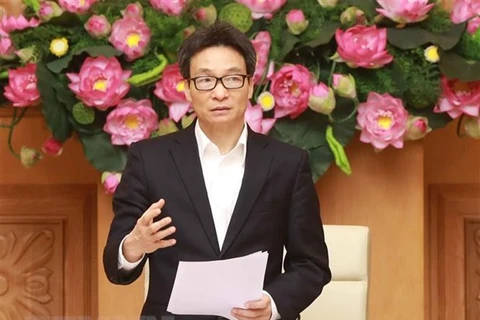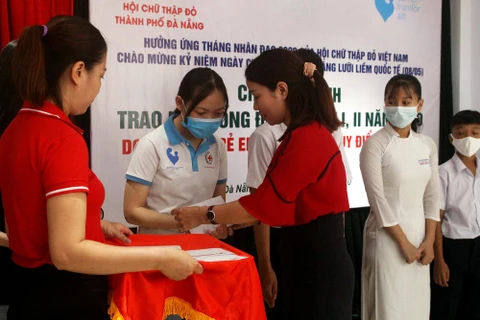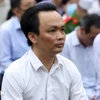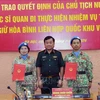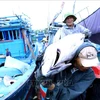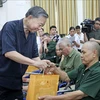Hanoi (VNA) - A UNDP report has found that some 30 percent of respondents in Vietnam who have disabilities were made unemployed by the COVID-19 pandemic while another 49 percent saw their working hours cut.
The report, which provided a rapid assessment of the socioeconomic impact of COVID-19 on Vietnamese with disabilities, was released by UNDP Vietnam on May 12.
It aimed to identify the health and socioeconomic challenges facing the disabled and their families during the pandemic and formulate recommendations to the government on COVID-19 disability-inclusive response and recovery.
The assessment was organized within the framework of the Provincial Administrative Performance Index (PAPI) project, which is funded by the Australian Department of Foreign Affairs and Trade, the Embassy of Ireland in Vietnam, and the Republic of Korea-Vietnam Mine Action Project, supported by the Korean International Cooperation Agency (KOICA).
It was conducted through an online survey of nearly 1,000 people with disabilities nationwide between April 14 and 28. Phone and face-to-face interviews were also organized for those who live in remote areas or had difficulties in completing the survey online. In total, 986 responses to the questionnaire were received.
The report, which provided a rapid assessment of the socioeconomic impact of COVID-19 on Vietnamese with disabilities, was released by UNDP Vietnam on May 12.
It aimed to identify the health and socioeconomic challenges facing the disabled and their families during the pandemic and formulate recommendations to the government on COVID-19 disability-inclusive response and recovery.
The assessment was organized within the framework of the Provincial Administrative Performance Index (PAPI) project, which is funded by the Australian Department of Foreign Affairs and Trade, the Embassy of Ireland in Vietnam, and the Republic of Korea-Vietnam Mine Action Project, supported by the Korean International Cooperation Agency (KOICA).
It was conducted through an online survey of nearly 1,000 people with disabilities nationwide between April 14 and 28. Phone and face-to-face interviews were also organized for those who live in remote areas or had difficulties in completing the survey online. In total, 986 responses to the questionnaire were received.
The survey also found that 59 percent of respondents saw their incomes reduced. Only 3 percent are actively looking for another job, while 19 percent are exploring additional ways to earn an income.
Some 71 percent of respondents had seasonal or informal jobs or were informal business owners, so are at risk of being ineligible for allowances from social welfare packages announced by the Government.
Only people certified as having severe or extremely severe disabilities are automatically entitled to receive assistance from the package, leaving out those with only mild disabilities, according to the report. As Government interventions are being rolled out around the country, it is expected that many more people with disabilities will receive support in the weeks ahead.
The report also indicated that awareness among people with disabilities during COVID-19 were high, with 67 percent of respondents feeling well informed.
The report put forward certain recommendations to the Vietnamese Government, including prioritising support for people with disabilities in urgent need of medical care and services and providing tele-health services where appropriate to facilitate health monitoring in the home.
It also urges the Government to provide food, financial allowances, and housing rental and utility bill support to ensure the financial security of those with disabilities, and guarantee that Government support packages are disability-inclusive by ensuring that coverage includes those working in the informal sector, by providing information on the package, and by introducing simple and transparent procedures./.
Some 71 percent of respondents had seasonal or informal jobs or were informal business owners, so are at risk of being ineligible for allowances from social welfare packages announced by the Government.
Only people certified as having severe or extremely severe disabilities are automatically entitled to receive assistance from the package, leaving out those with only mild disabilities, according to the report. As Government interventions are being rolled out around the country, it is expected that many more people with disabilities will receive support in the weeks ahead.
The report also indicated that awareness among people with disabilities during COVID-19 were high, with 67 percent of respondents feeling well informed.
The report put forward certain recommendations to the Vietnamese Government, including prioritising support for people with disabilities in urgent need of medical care and services and providing tele-health services where appropriate to facilitate health monitoring in the home.
It also urges the Government to provide food, financial allowances, and housing rental and utility bill support to ensure the financial security of those with disabilities, and guarantee that Government support packages are disability-inclusive by ensuring that coverage includes those working in the informal sector, by providing information on the package, and by introducing simple and transparent procedures./.
VNA

